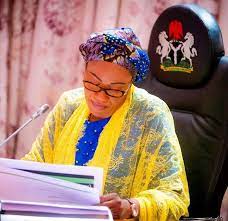The first lady, Oluremi Tinubu, has called for the appropriation and enforcement of stiffer laws and punishment for perpetrators of rape, sexual abuse and other forms of gender-based violence.
She made the call at the 1st Gender and Social Norms Summit organised by the United Nations Population Fund, UNFPA, in collaboration with her office.
The first lady, in a statement by her media aide, Busola Kukoyi, noted that the summit provides a common platform especially for stakeholders, including wives of state governors, to create awareness, exchange lessons learned and promote effective strategies for preventing and responding to GBV and other harmful practices.
“We must also develop state-specific action plans and promote the allocation of adequate resources in government budgets to support gender equality initiatives and GBV prevention programs.
Each state has unique cultural, social, and economic contexts, and our plans must reflect this diversity.”
“There must be improved legislation to give and enforce appropriate punishment to perpetrators of rape, sexual abuse and other forms of gender-based violence, who are dangerous and not deserving of roaming the streets.
We have to speak not only firm and tough but act accordingly.”
She decried the increased spate of rape cases and gender-based violence, which she described as alarming.
“Every single day, we hear about rape cases, even our babies are violated. Do we allow this trend to continue or look the other way?”
“That is why I am calling on the law enforcement agencies, the inspector general of Police, the attorney general of the federation and the chairman of the National Assembly, who is the senate president, to appropriate and enforce stiffer laws and punishment to perpetrators of rape, sexual abuse and other forms of gender-based violence.
No guilty party should be allowed to go free and roam the streets looking for the next victim”.
In their remarks, the Ministers for Education, Attorney General/Minister of Justice, Women Affairs and Youth supported ramping up awareness and ensuring that perpetrators do not go unpunished.
They noted that with improved education on the part of the girl child, youth improvement and women empowerment, amongst others, there would be a significant reduction, if not total eradication, of these harmful practices.
The UNFPA Gender/FGM Analyst Karima Bungudu, while presenting the works of the UNFPA in Nigeria based on situational Analysis, pointed out that nearly one in three Nigerian women have experienced some form of gender-based violence including women with disabilities who are the more susceptible and vulnerable ones.
The prevalence of harmful practices such as female genital mutilation and child marriage, which, in some cases, leads to Vesicovaginal Fistula (VVF) and other forms of violence against girls and women, remain unacceptably high.
The highlight of the event, which had in attendance wives of state governors, state commissioners of women affairs and health, traditional rulers and other stakeholders, was the signing of the Compact of Commitment by the first lady, Senator Oluremi Tinubu and wives of state governors reaffirming their determination to end GBV and other harmful practices in their states.
We’ve got the edge. Get real-time reports, breaking scoops, and exclusive angles delivered straight to your phone. Don’t settle for stale news. Join LEADERSHIP NEWS on WhatsApp for 24/7 updates →
Join Our WhatsApp Channel











